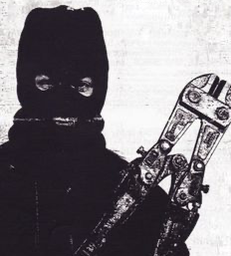If you need a microchip to tell apart the counterfeit, why would a consumer even care? Either you can tell by quality or you buy the cheaper one.
Because counterfeits aren’t cheaper, since they are sold as the real deal. The chip is probably there for retailers so they don’t get scammed on the supply side. They can’t do a taste test on every cheese wheel they buy.
Because this is between wholesalers and their customers. Not the consumer in the supermarket.
parm reg is a DOP (“Denominazione di Origine Protetta” (in Italian) "Protected Designation of Origin”) product, which means when you buy it you’re buying a guarantee that it was made in the traditional way, from traditional ingredients, in the area from which the tradition comes, using traditional methods. it’s a way of preventing the industrialization and inevitable bastardization of foods that are considered part of a people’s cultural heritage. counterfeits follow none of the DOP guidelines in order to minimize cost, and by the time it gets to the consumer who could verify whether the taste and other properties are actually as good as the legit DOP cheese the fraud is already complete.
Parmigiano is a protected name ans cheese in order to be called Parmigiano has to have certain characteristics (including abiding to maximum production volumes). People would buy because they trust the name.
Cant they just make a digiyal signature on a QR code?
It’s very simple to just print the same QR on the cheese by just taking a picture of it. The barrier to counterfeit the cheese is considerably higher if the measure is harder to copy.
Not the same code. Just like serial numbers, a different QR code in every wheel that can be verified on a website, for example.
welcome to the future, where you have to make an account on our website and link your parmesan cheese wheel to it to be sure of its authenticity
To be fair, this is for retailers, not consumers.
And ideally you can enter the serial-number on a website and know when it was produced and sold, this should be enough for you to know if its yours or not (or e.g. it was resold)An account is not needed to verify a QR code. Just take a look at what Brazil has done with QR codes. It’s everywhere and, in many places, it does exactly this, to verify the authenticity of a document, for example. I have e-signed documents and what goes on the paper is actually a QR code. It’s not difficult to imagine this being used to fight counterfeit goods.
how do you stop me re-using the same QR code on multiple cheeses?
you can encode the contents of a document in the QR code that you’re verifying to make sure it matches
you can’t encode cheese into a QR code
Make the qr code an NFT. Then you can’t copy paste it or else you’ll have crypto bros having fits in your dms.
Make QR a link. Consumer access the website and sees aproximate information about previous scanners with some of items identified as warehouses and shops.
That’s the route of cheese for you, and for them. Not ideal but can help you avoid doubles.
Until forgers’ cheese sells first and you have false-negatives (:
I find it hilarious that cheese wheels get defended more than money bills rather than having authorized resellers or something alike. I feel it’s more like DRM in a sense that making these chips is a business too, and someone found a customer in these scared cheesemakers.
You can encode the first order or link to a tracking website. Depending on the depths of the supply chain this means the wholesellers name needs to match with the factory, production and sale date. If there is 20 steps in between this would get difficult, but such a supply chain should not be trusted in the first place. So it would do the same as the tracker chip. And since there is no encryption mentioned, the signal of the tracking chip could be as easily copied as the QR code.
factory, production and sale date
nobody later in the supply chain will have any way of verifying what the production date or factory of their cheese should be
the sale date would only really apply if the same cheese is never sold twice, which seems unlikely and not very scalable
the signal of the tracking chip could be as easily copied as the QR code
it’s significantly harder to copy an embedded proprietary ID chip than it is a QR code
Not yet.




